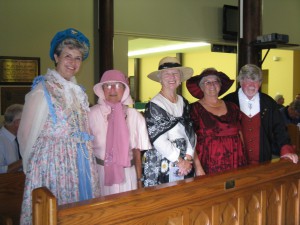The Bard and the preacher team up
When my wife and I were asked to come to our new parish in Eastern Ontario (we are a clergy team), we learned that one o
f the three points—Prescott—was the home of the St. Lawrence Shakespeare Festival. My father taught high school English, with several Shakespeare plays on the curriculum every year, so I grew up with Shakespeare being a rather important figure in my life.
I also appreciate the Anglican heritage of Elizabethan liturgy and music, so the idea came to my mind fully formed: why not have a Shakespeare Sunday, using the Book of Common Prayer Morning Prayer service, plus music from the Elizabethan era, and a sermon on one of the plays being performed that summer? It seemed so natural to try this that we had the first one arranged from afar before we even arrived, and it took place on the second Sunday we were in the parish.
Our fourth Shakespeare Sunday
 The Festival director, Ian Farthing, happens to be a Christian, and sang a solo at that first service, while some of the actors took part in the service as readers. The Festival players have been involved ever since. This year we will be celebrating our fourth Shakespeare Sunday, and I have so far been able to preach on Macbeth, Twelfth Night, Othello, and (this year) Hamlet.
The Festival director, Ian Farthing, happens to be a Christian, and sang a solo at that first service, while some of the actors took part in the service as readers. The Festival players have been involved ever since. This year we will be celebrating our fourth Shakespeare Sunday, and I have so far been able to preach on Macbeth, Twelfth Night, Othello, and (this year) Hamlet.
The service has not felt antiquarian. Most of our parishioners still remember the B.C.P. form of Morning Prayer, and we aim for the service to feel like worship of a traditional kind, and not just nostalgia. At the same time, we encourage parishioners and guests to wear appropriate costumes, and we do have a Shakespeare oriented icebreaker at the start of the service, such as a quiz to identify which plays certain quotes come from. We also end with a lunch of English pub food. So there is a light-hearted side to the Sunday, but I preface the service by saying that while the Elizabethans were a colourful society, their worship was both serious and meditative—and we are trying to be true to both.
Sin and evil in Macbeth
In the sermon, I don’t shy away from the serious Christian themes that the plays present with such powerful. In fact, I find that I can discuss sin and evil in Macbeth (for instance) in a way that might seem too direct for people if I was talking straight from Scripture. In preaching on Twelfth Night, I was able to raise the question of the role of comedy in the Christian life. It really is a good way to get the message across.
What is it that makes this service work? First of all, the Shakespeare Festival itself, which mounts very accomplished productions that are true to the Elizabethan spirit. Secondly, the inclination of my wife and myself to convey the Christian implications of Shakespeare’s plays, and to involve the actors in our worship. Thirdly, a congregation and a community that really want to hear Shakespeare expounded in a Christian way. This is a rather historically minded part of Ontario, and Loyalist country, attached to its English roots, so there is a natural fit here.
It all turns out to be a unique kind of witness to the gospel and suited to the situation of our parish. Since that first Sunday, two weeks after we arrived, Shakespeare Sunday has continued to flourish.
David and Tracey Smith are the Anglican priests of the three-point Parish of Cardinal, Maitland, and Prescott in the Diocese of Ottawa. You can read one of David’s Shakespeare sermons here.

